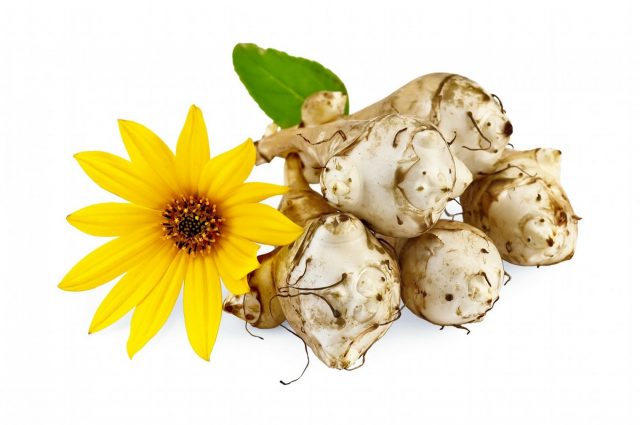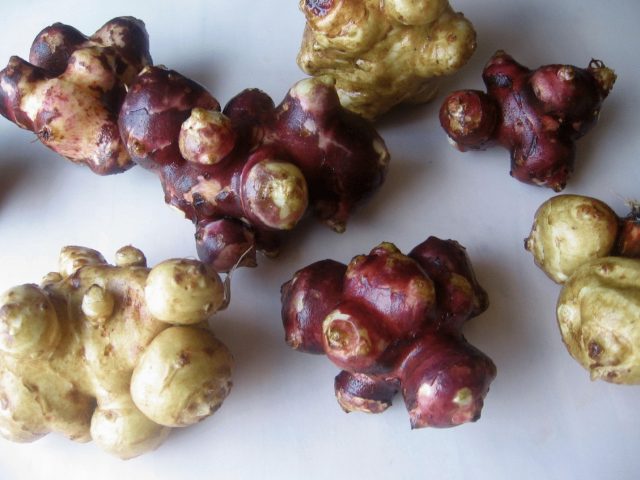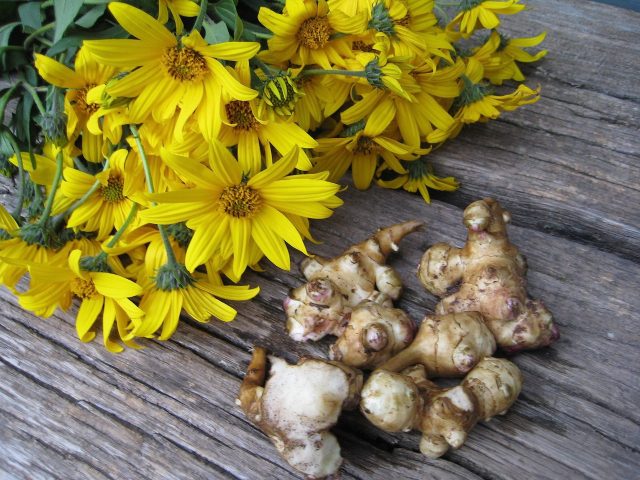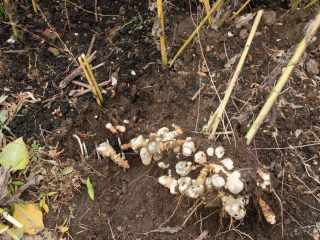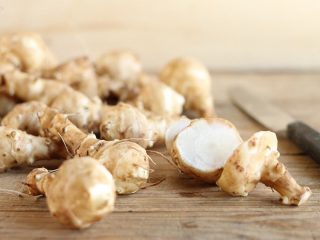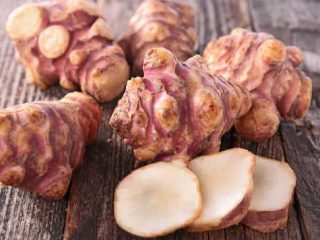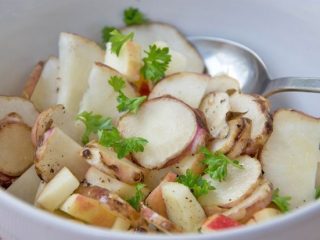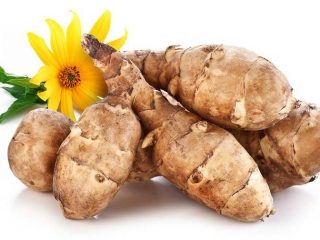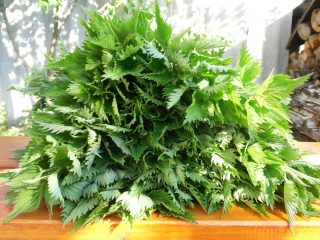Content
- 1 When to dig up Jerusalem artichoke
- 2 Jerusalem artichoke storage methods
- 3 Preparing Jerusalem artichoke for storage for the winter
- 4 How to store Jerusalem artichoke in winter in a cellar
- 5 How to store Jerusalem artichoke at home in winter
- 6 How to keep Jerusalem artichoke in the refrigerator
- 7 Is it possible to freeze Jerusalem artichoke
- 8 How to freeze Jerusalem artichoke
- 9 How to store Jerusalem artichoke before planting
- 10 Conclusion
There are several ways to store Jerusalem artichoke in winter. The main condition is to create the necessary microclimate for the tubers. If there is a high temperature and minimum humidity in the room, the root crop will dry out, lose its presentation and taste, and the shelf life will be significantly reduced.
When to dig up Jerusalem artichoke
Jerusalem artichoke ("earthen pear", "sun root", "Jerusalem artichoke") is a perennial plant with a high index of frost resistance. Ripe tubers extracted from the ground are not stored for a long time, their shell is very thin, as the root crop matures, it does not coarse, therefore, the root crop is practically not protected from rotting and drying out. For food, Jerusalem artichoke is dug in a small amount and immediately included in the diet, after 3 days the tubers are no longer suitable for food.
The accumulation of carbohydrates and nutrients occurs at the end of autumn, depending on the region of growth - in September or October. The tubers retain their chemical composition until spring. At the time of vegetation and the formation of new root crops, Jerusalem artichoke loses its taste and energy value. In the ground, the Jerusalem artichoke tolerates low temperatures well, without losing its composition and presentation. For storage, an earthen pear is harvested in the fall at the time of the first frost, for eating it is dug up in spring or autumn.
14 days before harvesting, the stalks of Jerusalem artichoke intended for digging are cut off for storage. Leave a shoot 25 centimeters above the ground. Nutrients will be used to form the root crop, the earthen pear will quickly accumulate the necessary chemical composition and ripen.
Jerusalem artichoke storage methods
The sun root is harvested in the amount necessary for the nutrition of the family. The product is whimsical in storage and requires compliance with certain conditions. Storage options for Jerusalem artichoke in winter:
- in the fridge;
- freezer:
- basement;
- by immersion in paraffin;
- on the balcony or loggia;
- in a trench on the site.
Preparing Jerusalem artichoke for storage for the winter
To store Jerusalem artichoke at home in winter, you need to properly extract the vegetable from the soil. The technology is similar to harvesting potatoes. The root system of the earthen pear is superficial, the formation of root crops occurs at a depth of 20–25 cm, the width of growth is about 30 cm. When removing the root from the soil, mechanical damage to the tubers is avoided. Several fruits are left in the ground, they will become the beginning of the growth of a new bush.
You can dig out the sun root with a shovel, in this case there is no guarantee that the fruits will not be damaged during work. The best option is to use forks with wide tines. The bush is carefully dug in from all sides and removed from the soil for the remains of the stem.
Jerusalem artichoke is separated from the bush, it is not recommended to cut the stalk, this manipulation will shorten the shelf life. Leave a root 10-15 cm long, in this form the fruits will retain more trace elements and nutrients. If the storage space permits, the tubers are left on the bush, only the root lump of soil is removed.When separated from the root, Jerusalem artichoke is carefully cleaned from the ground, put in a container and placed in a room with good ventilation to dry. Vegetables are not left in a place open to sunlight; exposure to ultraviolet radiation destroys most of the biological composition.
Before storage, Jerusalem artichoke is examined, only high-quality fruits can last until spring. Necessary requirements for a vegetable:
- In shape, tubers are of different sizes, rarely the same externally come across.
- The color of the shell is yellow, dark red, brown, this color range can be observed in one mother plant.
- The consistency of the vegetable is firm, elastic, reminiscent of potatoes; soft fruits are not suitable for storage.
- Bumps and bumps are normal.
- If there is mechanical damage, stains, lack of density, poor quality vegetables on the surface, they are discarded.
A prerequisite in the preparatory work is that Jerusalem artichoke is not washed before storage.
How to store Jerusalem artichoke in winter in a cellar
It is better to dig up Jerusalem artichoke in the fall, if the volume of the harvested crop is large, the easiest way to store it is to load it into the basement.
Indoors, you can easily maintain a constant temperature of +40 C and air humidity 85%. These are optimal conditions for an earthen pear. The area allows the tubers to be placed together with the bush, and not separately. There are several ways, each of them productive, choose at will:
- They are placed in a container with sand along with carrots, the requirements for the conditions are the same.
- The tubers are covered with a layer of clay, placed in wooden boxes or plastic containers, and tightly covered with dark material on top.
- Jerusalem artichoke is distributed in containers, covered with moss, peat or sawdust on top.
- Place the tubers in a plastic bag, release the air, tie tightly. Packages are put in a bag, sprinkled with soil.
Lighting has a detrimental effect on the sun root, the room should be dark. If this is not possible, then the container and packaging should not transmit light.
You can save Jerusalem artichoke for the winter using the waxing method:
- the vegetable is carefully cleaned of soil;
- melt food or candle paraffin;
- each fruit is dipped into the substance for a few seconds, removed;
- placed in boxes and lowered into the cellar.
The procedure is carried out in a cold room to cool the tubers quickly. Jerusalem artichoke is undesirable for prolonged thermal exposure. The method is laborious, but the most effective. In this state, the vegetable is stored for more than 3 months.
After laying, the tubers are periodically examined for decay. Spoiled vegetables are harvested to prevent bacterial infection from infecting nearby tubers.
How to store Jerusalem artichoke at home in winter
In the fall, the crop harvested in the country house, which is not equipped with a basement, is transported to the living quarters. In winter, to store Jerusalem artichoke at home, you can hang a bag of tubers outside the window onto the street. This method is used before the onset of severe frosts. If possible, the tubers in the box are sprinkled with sand and put on the site, covered with a board and spruce branches on top. In winter, they cover the snow in the form of a snowdrift. The design is convenient in that you can get vegetables out of the box at any time.
How to store Jerusalem artichoke in an apartment
Jerusalem artichoke is harvested in autumn, Jerusalem artichoke is stored in winter in an apartment on a balcony or loggia. Vegetables should be freshly dug and not purchased from a retail outlet. Purchased tubers are poorly stored.
Storage is different on the glazed and open balcony. Vegetables are placed on a closed loggia according to the following scheme:
- a layer of peat is placed on the bottom of the box or container;
- an earthen pear is laid on top;
- add peat, tubers must be completely closed;
- a layer of sawdust completes the shelter;
- cover the container with an opaque material;
- cleaned up to the balcony.
If the loggia is not glazed, the tubers are put in a bag, released air, tightly tied. The bags are placed in a canvas bag according to the scheme: a layer of soil, vegetables, and covered with earth on top. The bag is tied, covered with a blanket or old jackets. If the fruits freeze, it is not scary, they completely retain the taste and nutrients. In its natural environment, Jerusalem artichoke winters safely at -45 0C.
How to keep Jerusalem artichoke in the refrigerator
If the harvest of earthen pear is insignificant or purchased for the winter in small quantities and takes up little space, store it in the refrigerator. Refrigerated vegetables are usable for no more than 25 days. Algorithm of actions:
- Separate the fruit from the bush.
- Fragments of soil are removed from the surface.
- Wipe with a dry cloth without pressing.
- Moisten the fabric, wrap the fruits in it, you can use a container with a lid.
- Placed in the lower vegetable section.
- Keep the fabric damp.
Is it possible to freeze Jerusalem artichoke
The cold-resistant plant retains its biological composition and energy qualities well for 2.5 months after freezing. This is a guaranteed way to preserve Jerusalem artichoke for the winter, in which the fruits will not deteriorate. There is no need to worry about the integrity of the peel. The method is clean and not laborious; before laying the sun root, it is well washed under running water. The disadvantage of freezing is the small volume of the freezer, which does not allow storing a large amount of the product.
How to freeze Jerusalem artichoke
For freezing an earthen pear, fruits damaged during digging, on the surface of which there are minor spots, are suitable. The main condition is that vegetables must be fresh. It is recommended to freeze in portions, not in bulk. Sequence of work:
- The stalks and damaged areas are removed from clean tubers.
- Cut into cubes or plates, the shape of the cut is irrelevant.
- Put in packing bags, release air, tie tightly.
Placed in a freezer. Small containers can be used instead of bags. Defrost the product gradually, first take out a portion and put it on the refrigerator shelf for 2 hours, then in cold water.
How to store Jerusalem artichoke before planting
There is no need to specially dig Jerusalem artichoke in the fall to plant it in the spring. The culture is bred in October by dividing the mother bush, this method is also suitable for planting in May. The material retains the possibility of vegetation for only 14 days, after the expiration of the period, the earthen pear will not germinate. If the tubers were purchased on the market or from friends, and the planting time has not approached, the best way to maintain germination is to place the material in a wet cloth and put it in the refrigerator (not in the freezer).
Conclusion
There are several ways to store Jerusalem artichoke in winter, the main thing is to create the microclimate necessary for tubers. Important factors: humidity and lack of light. The temperature regime should not exceed +40 C. Longest shelf life in a freezer is 3 months, on a refrigerator shelf - 25 days. In the basement and on the balcony, vegetables are stored for up to 60 days.
